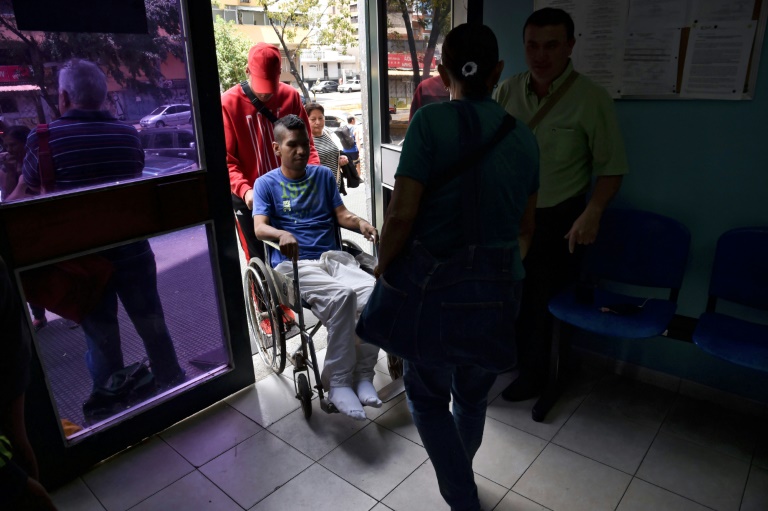
A patient leaves after receiving treatment for kidney failure at a state-run clinic in Caracas, on March 10, 2019 © AFP / YURI CORTEZ
Caracas, Venezuela, Mar 12 – Alfredo Quintero’s kidneys failed five years ago, so he needs dialysis three times a week just to stay alive.
But Venezuela’s massive power outage that caused chaos in the South American country left Quintero in a panic, with dry mouth and nausea.
He was actually connected to a hemodialysis machine when the lights went out.
Luckily, though, Quintero managed to take advantage of a brief resumption of electricity in parts of Caracas on Sunday to get the desperately needed blood purification treatment.
“I came to try my luck and thank God there was light,” said the 23-year-old.
The hemodialysis process involves the pumping of a patient’s blood through an external filter that replaces the defective kidneys.

People wait as their relatives receive treatment for kidney failure at a state-run clinic in Caracas © AFP / YURI CORTEZ
The blackout is into its fifth day and while electricity supply has been intermittent in the capital, several states have been totally cut off since Thursday.
At least 15 people died between Saturday and Sunday due to a lack of dialysis treatment, the non-governmental organization Codevida told AFP.
President Nicolas Maduro’s government, widely blamed for Venezuela’s economic meltdown, claimed on Sunday there were no deaths in public hospitals, adding that dialysis machines had been supplied by generator power.
– ‘Swollen’ –

The blackout has already killed at least 15 people due to non-functioning dialysis treatment © AFP / YURI CORTEZ
Of the 10,200 Venezuelans with kidney problems, 3,000 depend on dialysis, according to Codevida.
Quintero had to suspend his treatment on Friday after barely half an hour hooked up to a dialysis machine as the power cut out.
Another 39 patients at the Romulo Gallegos dialysis center in Caracas also had to leave without completing their treatment.
“Many of us were left swollen, full of liquid, it was awful,” said Quintero.
His grandmother, Delma Vargas, with whom Quintero lives, said: “I was really worried for him because he wasn’t urinating at all.”
Alex Arellano was not so lucky, he was connected to a dialysis machine for only 10 minutes before the power went out.
His mother Ninoska pushed him around in a wheel chair for several days as he suffered from an inflamed abdomen due to the lack of dialysis.
“It’s worrying, we know nothing,” she told AFP following the aborted treatment.
There were 40 patients alongside Alex being treated in the same room.
At the Romulo Gallegos center, 115 patients are normally treated each week.
The blackout, blamed by Maduro’s regime on cyber and electromagnetic attacks by the United States and opposition on the central hydroelectric complex in Guri, has affected all 139 dialysis centers in the country and the majority of hospitals, Codevida said.
– ‘Worse than war’ –

A state worker fills a tank to supply water at a state-run clinic where kidney failure is treated in Caracas © AFP / YURI CORTEZ
Jose Manuel Rodriguez, who took his 87-year-old father-in-law for dialysis treatment, said that “blackouts are a regular occurrence in Venezuela,” but previously Caracas had mostly been spared.
“This is worse than a country at war,” said Harlen Pereira, a 51-year-old bank employee whose brother Harold was waiting for treatment.
Maria Godoy, a nurse who connects patients to dialysis machines, said these have been “stressful days.”
The blackouts meant she had to reinject unpurified blood into patients.
Visual artist Frank Pacheco, 57, died at the Caracas University hospital on Sunday after eight days without dialysis — and other complications.
“There was an exam he couldn’t do, a treatment he couldn’t have, there were no elevators, and no nephrology specialist at the weekend. It was a tumultuous week,” Pacheco’s goddaughter Gabriela told AFP.
He had started suffering from kidney problems at 16 and underwent a transplant.
But “things got worse and a year ago he lost the kidney due to a lack of” medication, she added.
Venezuela is suffering from shortages of basic necessities such as food and medicine.
Supplies of the medication chronic patients like Pacheco depend upon are seriously lacking, with non-governmental organizations saying there’s a shortage of at least 75 percent of what’s needed.









































